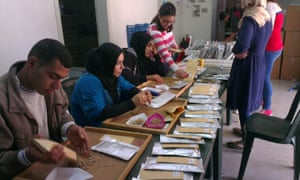The Good Stock
"We have to grow considerably different things in considerably different ways."
"Certainly for our prime crops, like wheat, the wild relatives are thought to be really important because of the genes that can be crossed back into the wheat lines we have in order to build resilience and adaptation to climate change."
Tim Benton, food security expert, University of Leeds, Britain
 |
| REUTERS/Khaled al-Hariri |
With the rapid onset of climate change, the world of agriculture is challenged to make the most of arable land to produce enough food stocks to feed the globe, in recognition of the potential of a diminishing reliability on accustomed weather patterns, making some places too cold to grow seasonal crops and other places too arid and hot. Seed banks famously serve as vital repositories of biodiversity, all the more so that original and heritage seeds have been industrially altered genetically for traits that make them desirable to agribusiness.
Lost in the process of this industrialization leading to genetic engineering is biodiversity. Which translates to crops with little variance becoming more susceptible to moulds and bacteria and pests specific to single-type crops. Who might have imagined that a Syrian seed hunter would have been responsible in large part for collecting a vast inventory of primal-era seeds from the geographic area biblically known as the 'fertile crescent'? Stationed in that ancient citadel of human habitation, Aleppo, more latterly under violent siege by the government of Syria's military.
Ali Shehadeh made it his life's work to collect all manner of wild seed grains to achieve a herbarium reflecting seeds foraged from the Fertile Crescent region where agriculture is broadly known to have originally arisen. It is his mission to hunt the genes in the seeds planted in our modern era in their original natural packaging as "wild relatives" from bygone eras, to safeguard those original seeds in the hope they will be sufficiently hardy to feed future generations as more geographic areas of the world become inhospitable to agriculture.
 |
| Staff at the International Centre for Agricultural Research in the Dry Areas in Torbol, Lebanon, sort through seed specimens delivered from the global seed vault in Svalbard, Norway. Photograph: Guardian |
His organization, the International Center for Agricultural Research in the Dry Areas (ICARDA), struggles to fulfill its function in view of the viral trifecta of food, weather and war. At one time the government of Syria supported ICARDA, though it failed to fund the enterprise based in Aleppo; interested in the research that promised to ensure Syria was self-sufficient in the production of wheat. However, the experiment drained underground water reservoirs and when a drought occurred, the protests that morphed into armed revolt of the citizenry against the Syrian government was launched.
Civil conflict erupted in 2011, and fighting threatened ICARDA's Aleppo headquarters by 2014. Its nearby field station became a casualty of civil war, its trucks stolen, generators as well, and most of the experimental Awassi sheep bred for increased milk production were stolen and used for meat. Along with the other scientists, Mr. Shehadeh managed to save a few sheep then saw no option but to abandon their field station, becoming refugees in exile, leaving behind their 144,000 seed bank varieties of the region's main crops.
Back in 2008 ICARDA had sent seed samples to the Svalbard Global Seed Vault in Norway. Then, later, ICARDA scientists set up a seed bank in Morocco and another one in the Bekaa Valley in Lebanon. "We are doing our best to recreate everything we had in Aleppo", explained Mr. Shedadeh of the headquarters adjacent the ancient city where the region's collection of wheat, barley, lentils, fava beans and other seeds have been stored.
 |
| Lebanon’s Bekaa valley offers a wealth of ecosystems — and now hosts a growing ICARDA seed bank. Hussein Malla/AP |
The region is seeing the occurrence of more droughts, more intensely and more frequently. In hot, dry countries of the Middle East, temperatures are becoming hotter for more sustained periods of time. Precisely what it is that motivates Mr. Shehadeh's obsession with the wild relatives of the seeds most planted by today's farmers. But rather than the genetically modified seeds, Mr. Shehadeh envisions the characteristics of their wild ancestors, better adapted to such harsh climates. "They're the good stock", in his opinion.

Labels: Agriculture, Bioscience, Civil War, Climate Change, Syria

0 Comments:
Post a Comment
<< Home